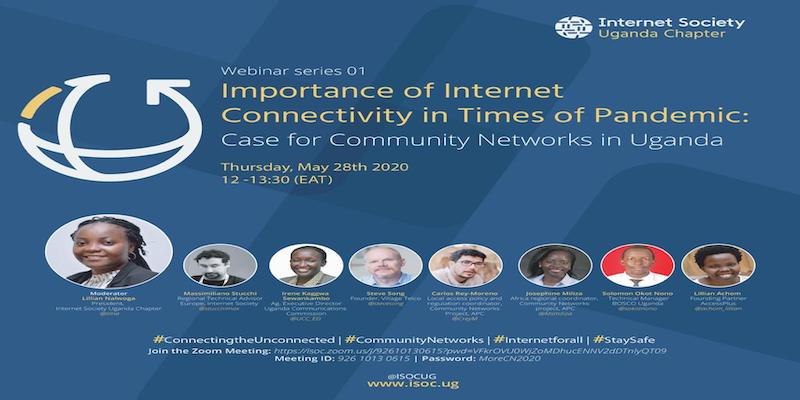- June 11, 2020
- Posted by: admin
- Category: Blog, Events, News

The novel coronavirus disease (COVID-19) has affected millions of people across the world and has caused many countries to embark on preventive measures such as restricting movements, closure of schools and business among others. This has forced people to stay home with the emphasis to utilise the internet to access information and key services for their day to day survival. This has made the internet a basic need for everyone. However, poor people without internet access, the lockdown further marginalises them as it makes it harder for them to have access to public services, education and other essential services they need for their survival.
On Thursday, 28 May 2020, the Internet Society Uganda Chapter hosted a webinar: Importance of Internet Connectivity in Times of Pandemics: Case of Community Networks in Uganda. The webinar sought to explore the importance of rural broadband connectivity in times of pandemics and how community networks can play a role in connecting the unconnected. The webinar also explored policy solutions needed to strengthen community networks as alternatives to rural connectivity while seeking to promote the creation and growth of community networks in Uganda.
The webinar attracted both technical and policy experts, who shared their experiences and best practices in establishing and running successful community networks. Below is a summary of the discussion: –
Massimiliano Stucchi, Regional Technical Advisor – Europe, Internet Society -highlighted the internet society’s work in promoting connecting the unconnected through its support to community networks in Africa and beyond.
Josephine Miliza, Africa Regional Coordinator, Community Networks Project, Association for Progressive Communications (APC) – shared the importance of community networks and how they can support the work of main internet service providers. community networks provide connectivity to areas where networks cannot reach. She shared that investment in community networks requires formation of community based cooperatives and community based organisations through simplification of application processes and involvement of community members and champions who understand local perspectives in policy formulation and implementation; promote mechanisms that enable peer to peer learning opportunities that facilitate knowledge sharing amongst community networks and establishment of programmes that go beyond digital literacy.
Lillian Achom, Founding Partner, AccessPlus – highlighted the importance of utilising community networks to boost women’s businesses and empowering women to run these initiatives. Besides, by bringing technology closer to people, community networks can assist in demystifying misinformation about technology within the community.
Solomon Okot Nono, Technical Manager, BOSCO Uganda – shared that the organisation is being used during the covid-19 induced lockdown in Uganda to support e-learning by enabling parents download and print the learning materials circulated by the education ministry thus allowing children continue learning during the lockdown. He also shared that churches in their community were using Bosco Uganda’s Wi-Fi to livestream mass to community. He however called for the need to address infrastructure challenges such as those brought about by inadequate electricity supply. To his, he called to embrace use of solar energy as an alternative to electricity.
Carlos Rey-Moreno, Local Access Policy and Regulation Coordinator, Community Networks Project, APC– shared on how South Africa’s regulatory framework enabled the establishment of Zenzelani community network and how the network has addressed connectivity challenges during the covid-19 pandemic in the country. He noted that there has been an increase in the use of the network’s traffic which also offering community members a zero-rated platform to access public information especially around covid-19 related information.
Steve Song, Founder, Village Telco, highlighted the role of telecom operators can play in boosting rural connectivity and supporting the work of community networks. He welcomed the emergency of enabling frameworks that support establishment of community networks especially in Uganda. These frameworks should however to able to address the current bottle necks limiting community networks such as access to backhaul, access to wireless technologies and access to funding and subsidies. Steve also emphasised the importance of transparency in private sector infrastructure deployment investments.
Eng. Irene Kaggwa Sewankambo, Ag. Executive Director, Uganda Communications Commission (UCC). She shared current initiatives and regulatory frameworks that support the establishment and operations of community networks in Uganda. These included the national broadband policy that provides for national roaming and the regulator in process of developing guidelines for this; new licensing framework which provides for infrastructure sharing and establishes a communal license. Further, she shared that Uganda is technology neutral to the provision of services by individuals and seeks to encourage this in the various frameworks including radio spectrum authorisations; developed provisions for use of TV white space and establishment of the Rural Communications Development Fund (RCDF) to enable provision of services to underserved areas. Some of the Services include – provision of public Wi-Fi spots at post offices and at public libraries. She stressed the issue of creating awareness of the importance of ICT and upskilling so that people appreciate its use. As such UCC is responding to this demand side of technology by conducting skills programs for youth, women, people with disabilities (PWDs), SMEs and agriculture sector so that they can appreciate value of ICTs in their lives. In response to the issue of transparency in infrastructure deployments, she further stressed the need for regulation and control to protect its abuse.
The webinar attracted 50 participants and was organised as a deliverable by Lillian Achom, a beneficiary of the Internet Society (ISOC) Global Volunteer Training, a program that aimed at developing new community leaders.
Watch the video recording here – https://livestream.com/internetsociety/isocug1 and transcript here – https://otter.ai/s/N65_Sd_GQWiOEyUztsVbrw

